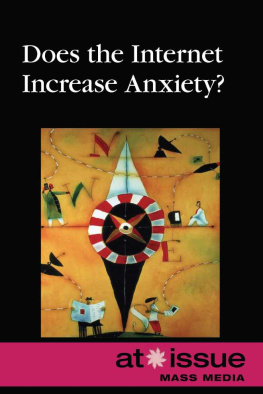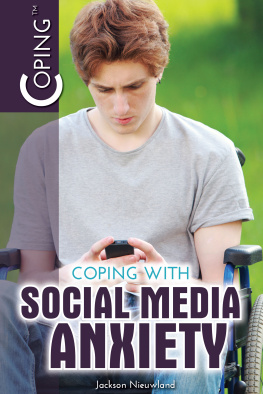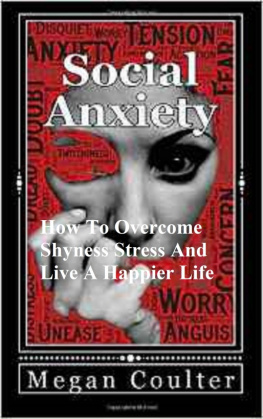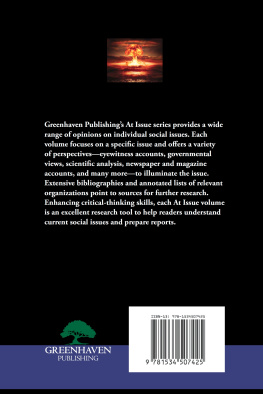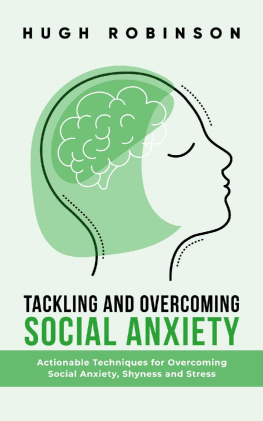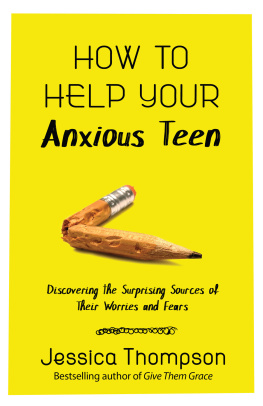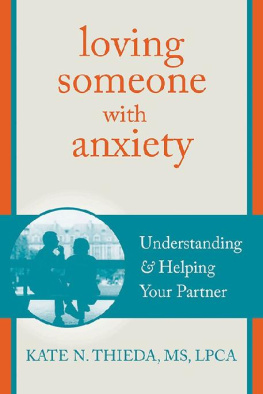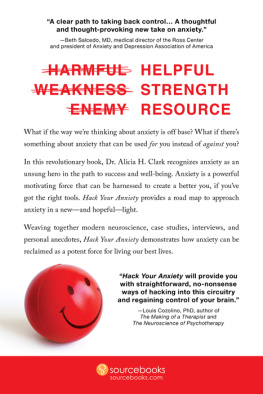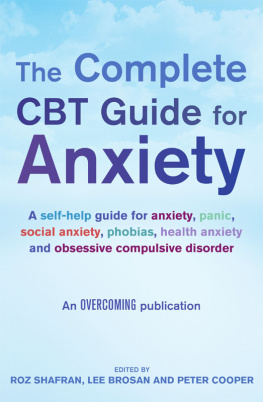Tamara Thompson - Does the Internet Increase Anxiety?
Here you can read online Tamara Thompson - Does the Internet Increase Anxiety? full text of the book (entire story) in english for free. Download pdf and epub, get meaning, cover and reviews about this ebook. year: 2016, publisher: Greenhaven Publishing, LLC, genre: Politics. Description of the work, (preface) as well as reviews are available. Best literature library LitArk.com created for fans of good reading and offers a wide selection of genres:
Romance novel
Science fiction
Adventure
Detective
Science
History
Home and family
Prose
Art
Politics
Computer
Non-fiction
Religion
Business
Children
Humor
Choose a favorite category and find really read worthwhile books. Enjoy immersion in the world of imagination, feel the emotions of the characters or learn something new for yourself, make an fascinating discovery.
- Book:Does the Internet Increase Anxiety?
- Author:
- Publisher:Greenhaven Publishing, LLC
- Genre:
- Year:2016
- Rating:5 / 5
- Favourites:Add to favourites
- Your mark:
- 100
- 1
- 2
- 3
- 4
- 5
Does the Internet Increase Anxiety?: summary, description and annotation
We offer to read an annotation, description, summary or preface (depends on what the author of the book "Does the Internet Increase Anxiety?" wrote himself). If you haven't found the necessary information about the book — write in the comments, we will try to find it.
This book explores the new phenomena of anxiety surrounding the Internet, which has developed with the explosion of social media use. Mobile-devise separation anxiety, digital overload, and activity tracking are a selection of topics discussed.
Does the Internet Increase Anxiety? — read online for free the complete book (whole text) full work
Below is the text of the book, divided by pages. System saving the place of the last page read, allows you to conveniently read the book "Does the Internet Increase Anxiety?" online for free, without having to search again every time where you left off. Put a bookmark, and you can go to the page where you finished reading at any time.
Font size:
Interval:
Bookmark:

Judy Galens, Manager, Frontlist Acquisitions
2016 Greenhaven Press, a part of Gale, Cengage Learning.
Gale and Greenhaven Press are registered trademarks used herein under license.
For more information, contact:
Greenhaven Press 27500 Drake Rd.
Farmington Hills, MI 48331-3535
Or you can visit our Internet site at gale.cengage.com
ALL RIGHTS RESERVED.
No part of this work covered by the copyright herein may be reproduced, transmitted, stored, or used in any form or by any means graphic, electronic, or mechanical, including but not limited to photocopying, recording, scanning, digitizing, taping, Web distribution, information networks, or information storage and retrieval systems, except as permitted under Section 107 or 108 of the 1976 United States Copyright Act, without the prior written permission of the publisher.
For product information and technology assistance, contact us at Gale Customer Support, 1-800-877-4253
For permission to use material from this text or product, submit all requests online at www.cengage.com/permissions .
Further permissions questions can be e-mailed to .
Articles in Greenhaven Press anthologies are often edited for length to meet page requirements. In addition, original titles of these works are changed to clearly present the main thesis and to explicitly indicate the author's opinion. Every effort is made to ensure that Greenhaven Press accurately reflects the original intent of the authors. Every effort has been made to trace the owners of copyrighted material.
Cover photograph reproduced by permission of Brand X Pictures.
LIBRARY OF CONGRESS CATALOGING-IN-PUBLICATION DATA
Does the Internet increase anxiety? / Tamara Thompson, Book Editor. pages cm. -- (At issue)
Includes bibliographical references and index.
ISBN 978-0-7377-7382-8 (hardcover) -- ISBN 978-0-7377-7383-5 (pbk.)
1. Internet--Psychological aspects. 2. Information technology--Psychological aspects. 3. Anxiety. I. Thompson, Tamara, editor.
HM851.D626 2016 303.48'33--dc23
2015029476
Printed in the United States of America 1 2 3 4 5 6 7 20 19 18 17 16
1. Mobile Device Separation Anxiety Isa Growing Problem
Olivia Rahim
2. Nomophobia Is an Artificially Created Disorder
Mario Lehenbauer-Baum
3. Digital Multitasking Is Linked to Depressionand Anxiety
Tara Haelle
4. Social Media Can Cause or Worsen AnxietyDisorders
Dana Duong
5. Cyberbullying Creates Dangerous Stressand Anxiety
Sameer Hinduja and Justin W. Patchin
6. Researching Health Symptoms Online CanCause Unnecessary Anxiety
Ben Meghreblian
7. Digital Overload: Too Much Technology
TakesaTollNed Smith
8. Using Technology Mindfully Can ReduceAnxiety from Digital Overload
Anastasia Papazafeiropoulou
9. The Internet Doesnt OverwhelmMost Americans
Chandra Johnson
10. Activity Tracking Can Cause Anxietyand Hyper-Vigilance
Mary E. Pritchard
11. Activity Trackers Are a Healthy FitnessMonitoring Tool
Tyler Hayes
12. Online Gaming Addiction Can Cause aHost of Mental Health Problems
Han-Ting Wei et al.
13. Online Gaming Can Help Ease Social Anxiety
Anastasia Wythe
14. The Constant Lure of Smartphones Is Badfor Childrens Mental Health
Peter Stanford
W hen transcendentalist author Henry David Thoreau wrote in Walden that men have become the tools of their tools, he was talking about the negative effects that the Industrial Revolutions technological advances were having on American society in 1854. But he just as easily could have been commenting on our modern societys current obsession with mobile devices.
Visit any public place and it quickly becomes apparent just how deeply involved Americans have become with the mobile technology of smartphones, tablets, and other devices that allow users to access the Internet anywhere and at any time. On public transportation, in restaurants and movie theaters, on street corners, and even in the middle of crosswalks, it can sometimes seem like every single person has their head down, tapping at a device, and their near-constant public use has become the punch line for countless late-night jokes and scathing social commentaries.
Mobile devices, of course, serve a wide array of important functions that have become integral to users lives; they facilitate everything from banking and bill paying to getting driving directions, occupying cranky toddlers in the back seat of cars, finding a restaurant or a ride, and keeping on top of the news and up to date with friends and family on social media.
According to the 2015 Internet Trends report by the consulting firm Kleiner, Perkins, Caufield, Byers, more than half the US population uses a smartphone to access the Internet, and 2015 daily consumption of digital media was nearly 5.6 hours per person51 percent of it on mobile phones. For young people, social media is the primary reason for Internet and smartphone use; in spring 2015, 74 percent of American teens used Facebook, 59 percent used Instagram, 57 percent used Snapchat, and 32 percent used Twitter, according to the Internet Trends study.
Nearly 90 percent of Millennials (individuals born from the early 1980s to early 2000s, roughly those aged fifteen to thirty-five) reported that my smartphone never leaves my side, night or day, 1 and 80 percent said that checking their phone is the first thing they do when they wake up, even before brushing their teeth.
The demand for mobile devices isnt likely to slow anytime soon. According to the web-based statistics portal Statista, US smartphone use is expected to grow from 182.6 million in 2015 to more than 220 million by 2018. Globally, the number is expected to reach 5 billion by 2017, with China and India being the biggest adopters of the technology.
But as much as smartphones, tablets, and computers are useful tools to keep users connected, informed, and entertained, they are also shaping the behavior of their users, and not always for the betterjust as Thoreau observed that the telegraph and steam engine were doing in his own time. Many experts say that the constant connectivity of todays mobile devices is eroding social skills and having a detrimental effect on mental health. As the authors in this volumes viewpoints discuss, the Internet has the potential to increase anxiety in a variety of ways:
The constant connectivity of smartphones can be so addictive that many users experience the anxiety of nomophobiapalpable stress and discomfort from being disconnected or out of touchwhen they are prevented from using their devices.
Multitasking with various forms of technologysuch as texting while surfing the web or talking on the
phone while gaming or watching streaming videohas been linked to both depression and anxiety.
On social media, the fear of missing out (FOMO) can worsen existing social anxiety disorders and can also create new anxieties about real-life interactions.
Searching for health information online can increase anxiety because even when people search for common and innocuous symptoms, 70 percent of the time the results show information about serious and rare conditions instead.
Cyberbullying in chat rooms or by text, e-mail, social media, or any other digital means can have serious consequences, including anxiety, depression, and suicidal behavior.
The more hours spent gaming online, the stronger the link to social anxiety disorder, social phobia, depression, and even pain.
Next pageFont size:
Interval:
Bookmark:
Similar books «Does the Internet Increase Anxiety?»
Look at similar books to Does the Internet Increase Anxiety?. We have selected literature similar in name and meaning in the hope of providing readers with more options to find new, interesting, not yet read works.
Discussion, reviews of the book Does the Internet Increase Anxiety? and just readers' own opinions. Leave your comments, write what you think about the work, its meaning or the main characters. Specify what exactly you liked and what you didn't like, and why you think so.

